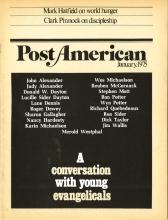“The Young Evangelicals” has been the newest phrase to emerge on the theological landscape this past year. Originally used in a book of the same title by Richard Quebedeaux [reviewed, Post American, June-July, 1974], the new designation has generated much discussion and controversy especially in relation to “establishment evangelicalism.” While much of the dialogue has been good and helpful, it has tended to focus on the “positions” of the young evangelicals rather than on the people themselves, who are the most significant part of the new evangelical consciousness.
Many of these “young evangelicals” attended the recent Thanksgiving Conference on Evangelical Social Action in Chicago. The Post American hosted a conversational interview between a number of the young evangelicals to try and get at the people behind the positions: who we are, what are our most basic commitments, what are our deepest struggles and questions, how we perceive ourselves, our lifestyle and our theology, how we look at the future.
Those involved in the discussion included men and women with a range of vocations, concerns and life-situations; most are members of communities, support groups, churches; some work and study in established institutions, and some have created their own. Most have some sort of evangelical background or tradition.
Read the Full Article

